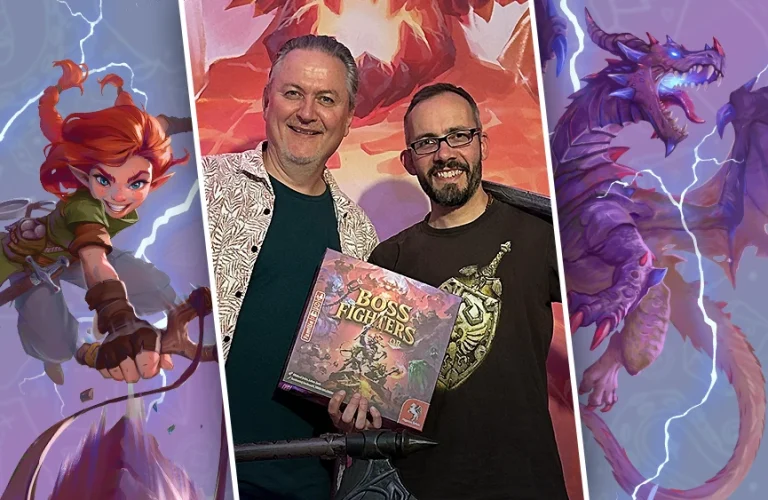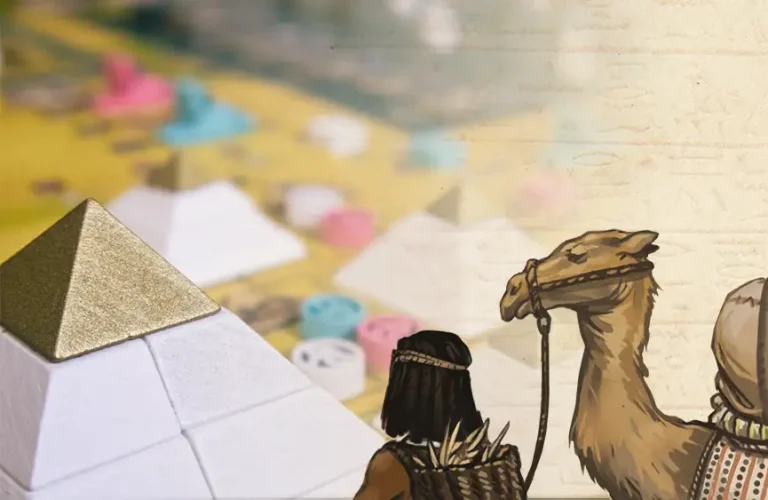At the end of last year, Stefan Bauer’s first game Corrosion was published. Our partner Deep Print Games was in charge of the editorial work. Deep Print Games was established in 2020, making Corrosion the first expert level game published by them. In addition to the genius game principle, the development of Corrosion is especially interesting since Stefan Bauer was connected to Deep Print Games at the first Pegasus Designer Days. Since spring 2020, game designers regularly get the chance to present their ideas to our editorial team as well as Deep Print Games’ editors (expert level games) and the creative agency Mühlenkind (children’s games) during the Designer Days – online via video call.
March 10-12, 2022 the sixth Pegasus Designer Days will take place, making now the perfect time to take a closer look at what the path from a first idea to a finished game can look like. Stefan Bauer tells us more about this as Corrosion is not only his first published game but also the first game published after being presented at the Designer Days.
Stefan, let’s start at the beginning: how did you get into playing board games?
„That started pretty early, in my childhood, but it was initially limited to chess. Then, I became interested in modern board games during my time at university and quickly discovered that I enjoyed complex, strategic games.“
And how did it come about that you took the step from playing games to developing them?
„The thought of being able to or wanting to design my own board game first crossed my mind during a business trip about five years ago. The evenings at the hotel were boring, so I gave my creativity free reign and filled a hotel writing pad with ideas of alluring mechanisms and themes. My first prototype was complete a year later. It was a complex game with some exciting elements, but the theme was rather boring, it was a kind of Tower Defense game. I wouldn’t want to present it to a publisher nowadays.“
How did you learn of the Pegasus Designer Days? Why did you decide to sign up?

„That was actually a coincidence. While looking around the Pegasus website, I stumbled upon the announcement for the first Designer Days. It was pretty late during the registration period and my latest prototype ‚Rust‘ was well-tested but only available online. I didn’t have a physical version or a written-out rule book yet. But I decided to register nonetheless. I think it was partly to prove to myself that I was able to present a game in this way.“
How did you prepare for the digital meeting?
„For me, the most important preparation was to get a feeling for what I could squeeze into 10 minutes. That’s not much time for a game on expert level, so I had to concentrate to not include too many details on the mechanisms. Also, mundane things like adjusting my phone to the ideal angle. :)“
What was the meeting with the editor like? Were you nervous?
„Yes, very! I didn’t have any experience presenting games via a video call. There were also ‚trivial‘ worries: Will the technology work? Will I muddle up during the presentation? Who will I be presenting the game to and will they already be tired of hearing about yet another game on that day? It turned out to be Peter Eggert from Deep Print Games. He was very relaxed and that calmed me down, too. I started by giving some basic information on the game, like the complexity level, the game idea and the theme. After that I explained some of the core mechanisms. In the end, the meeting took a bit longer than planned – 10 minutes go by faster than one would think.“
What do you think convinced Peter Eggert and Deep Print Games’ editorial team of your game idea? Did you receive feedback right away or later on?
„I included more details than I had originally planned so I’m not sure what ultimately convinced them. I guess, it was the fact that the engines are temporary in this game. They are continuously taken away again by the rust and you have to reinvent yourself during the course of one game. The rusting process continues throughout the game, ruthlessly disturbing the player. Peter gave me feedback a few days later. He really liked the idea and asked for a physical prototype.“
What happened after the digital meeting? When did you know that your game would actually be published?
„At first, I needed to hurry because I didn’t want to make Peter wait for the prototype for too long. After that I had to be patient. About half a year later, I got a definitive approval and a few months after that I received a contract – that was worth a public leap of joy. :)“
Let’s take a closer look at how your game went from idea to actually being published thanks to the Designer Days. How did you get the idea for Corrosion? Did you start with the theme or with the mechanism?

“There are some games in which you get to perform the actions that other players choose during their turn. I wanted to make this a dilemma where the imitation of actions was linked to disadvantages, so you would have to weigh up the positive and negative effects. It shouldn’t be automatic to just join the actions of the other players. So, I used spokes on a wheel to indicate when I would get my used action cards back.
After the core mechanism of the wheel, I thought about a fitting theme for a long time because I wanted to base all additional mechanisms on that so the game wouldn’t be thematically interchangeable. Again and again, I made simple prototypes but none of the themes I tested completely convinced me. One night the thought of ‘rust’ as a theme crossed my mind and consequently resources and machines came upon the wheel, so my engines would be able to rust. I discarded the idea right away because deteriorating engines in an Engine Builder would almost be breaking a taboo. But nevertheless, I was fascinated by the idea and within a few minutes the game seemed to have completed itself. I didn’t want to wake up my wife and was too tired to get up so I wrote down my ideas in the dark at the bedside table. In the morning, I was very relieved to find that I could still decipher my scribbles.“
Which games do you feel most drawn to? What makes a good game, in your opinion?
„I do have some favorites, obviously, but I’m especially tempted by new games. I want to play as many games as possible and see what is possible. What kind of games someone likes differs from person to person, of course. For me, personally, an outstanding game needs to combine an innovative mechanism and, preferably, an innovative theme. If it is also a bit more complex and abstains from elements of luck and Take That, I’m in – for example a game of Myrmes. :)“
Can we look forward to more of your games? Do you have any ideas in mind?
„Sadly, I have less time for developing games than I would like. Nonetheless, game ideas are slowly starting to replace actual games in my cabinet. A new prototype is currently being tested by a publisher. I hope that Corrosion doesn’t stay my only published game. Although, I do have to say that I wouldn’t stop developing games even if I knew that none of them would ever be published.“
One last question: What advice would you like to give to new game designers?
„I think, you shouldn’t develop a game only with the intention of publishing it. Looking at the statistics, that’s rather unlikely to happen. Consequently, you shouldn’t put too much pressure on yourself when presenting a game or try to accurately stick to a script during a pitch. That’s simply unnecessary. I admit, though, that I had and have to stop myself from doing that, too.“
Thank you, Stefan, for giving us some insight into the development of your game and your experience with the Pegasus Designer Days!
If you have a game idea that cannot stay in the drawer or on your hard drive unused any longer, you can sign up for the next Pegasus Designer Days until February 27. Our editorial team is looking forward to your ideas! If you want to know even more about the Pegasus Designer Days, also check our interview with Klaus, head of Game Publishing, after the Designer Days in May 2020, where Stefan Bauer presented his game.
Questions, comments, feedback? Share your thoughts with us at blog@pegasus.de.






